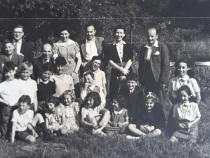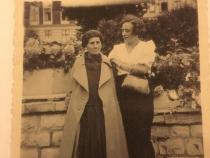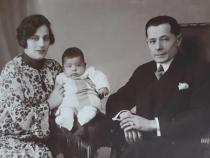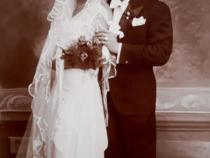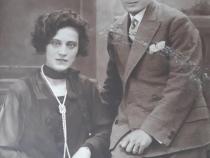Location
Christinenstr. 23
District
Prenzlauer Berg
Stone was laid
14 June 2018
Born
16 February 1900 in Sambor (Ukraine)
Occupation
Schneiderin
Escape
1938 Polen
Fate unknown
Ettel Feldt was born on February 16th, 1900 in Sambor (ukr. Sambir), Ukraine to her parents Szulim Szyja Zimbler and Jüdes Feldt. It is unclear when exactly she moved to Berlin. From what we know she had at least four sisters, some of whom also lived in Berlin. She was trained as a seamstress and initially lived at Strassburger Straße 20 in Prenzlauer Berg. One of Ettel’s sisters, Erna (Esther) Mergrün, was married to Yankiel Mergrün who owned a store where uniforms were made and sold. Ettel possibly worked in that family business as a seamstress.
Sometime in the 1920’s, Ettel met Schlama Klainberg (also written as Schljama Klainberg). They were married in Berlin on September 5th, 1928. Schlama was a shoemaker by trade, and later opened a cobbler shop on Christinenstraße 23 where the family last lived. According to the memories of Schlama and Ettel’s son Siegmar, the family’s apartment was on the ground floor of the building, either as part of the shop or right above it.
On September 21st, 1929, Ettel and Schlama’s only child, Siegmar, was born at the Israelitisches Krankenheim in Elsässer Str. 85 (today Torstraße 146). According to Siegmar’s birth certificate, the young family lived in Strassburger Straße 20 at the time of his birth, although Schlama Klainberg was listed in the Jewish Address Book from 1931 as living in Christinenstrasse 26, and Ettel Klainberg as living on Straßburger Straße 20. It is interesting to note that Ettel had listed herself as “Ethel Kleinberg” in this address book. Why there are two addresses is not clear. It’s possible that Schlama found a space in the building on Christinenstrasse 23 to open his cobbler shop, and lived alone on Christinenstrasse 26 until an apartment opened up in Christinenstrasse 23 where the whole family could move into. It’s also possible that the family wanted to reside near Ettel’s sister Erna Mergrün who lived with her family in the vicinity of Teutoburger Platz – a park which lies one block away from Christinenstraße 23.
Early in the morning on October 28th, 1938, Schlama Klainberg was arrested and taken to Bentschen (pol. Zbasyn) during the “Polenaktion.” This event saw more than 16,000 primarily Jewish men with Polish citizenship arrested and taken to the Polish border where they were placed in an internment camp. People were arrested in their homes and without any notice. Refugee records from the internment camp at Bentschen show that Schlama arrived in Bentschen and that he did register as a refugee and even had a local address. Some of interred persons were eventually allowed to move further into Poland, or they managed to secure immigration papers for a third country, and some were allowed to return to Germany to bring their wives and children, and settle their affairs. Whether Schlama was able to leave the Bentschen camp at some point, or was deported to another place after its closing in August of 1939 remains unknown.
Ettel Klainberg remained in Berlin with their son Siegmar after Schlama’s arrest. She managed to secure a passage to England for Siegmar on a Kindertransport which left Berlin on May 11th, 1939. Siegmar Klainberg went on this Kindertransport together with his cousins Anne, Ziggy, and Leonhard Mergrün – all three the children of Ettel’s sister Erna Mergrün.
Once Siegmar arrived in England, he was taken in and raised by Ettel Klainberg’s sister Regina (Rebecca), who had emigrated to England before the war. Ettel Klainberg remained in contact with her sister Regina for some time after Siegmar arrived in England, but at some point that contact was lost.
Ettel Klainberg’s nephew Leonard Mergrün spoke in his interview with the Shoah Foundation of his older brother Fred, who fled to England in 1938 and was in contact with their mother Erna Mergrün. Erna was writing from the Warszaw Ghetto, according to Leonhard’s memories, and Fred was sending her money. It is possible that Ettel Klainberg remained in Berlin together with her sister Erna Mergrün after they sent their children to England with the Kindertransport, and that both were deported the Warsaw Ghetto at some point. It is also possible that Ettel went to Poland and tried to reunite with her husband. She might have also gone underground. To this day, the fate of Ettel Klainberg during the war remains unknown.
Sometime in the 1920’s, Ettel met Schlama Klainberg (also written as Schljama Klainberg). They were married in Berlin on September 5th, 1928. Schlama was a shoemaker by trade, and later opened a cobbler shop on Christinenstraße 23 where the family last lived. According to the memories of Schlama and Ettel’s son Siegmar, the family’s apartment was on the ground floor of the building, either as part of the shop or right above it.
On September 21st, 1929, Ettel and Schlama’s only child, Siegmar, was born at the Israelitisches Krankenheim in Elsässer Str. 85 (today Torstraße 146). According to Siegmar’s birth certificate, the young family lived in Strassburger Straße 20 at the time of his birth, although Schlama Klainberg was listed in the Jewish Address Book from 1931 as living in Christinenstrasse 26, and Ettel Klainberg as living on Straßburger Straße 20. It is interesting to note that Ettel had listed herself as “Ethel Kleinberg” in this address book. Why there are two addresses is not clear. It’s possible that Schlama found a space in the building on Christinenstrasse 23 to open his cobbler shop, and lived alone on Christinenstrasse 26 until an apartment opened up in Christinenstrasse 23 where the whole family could move into. It’s also possible that the family wanted to reside near Ettel’s sister Erna Mergrün who lived with her family in the vicinity of Teutoburger Platz – a park which lies one block away from Christinenstraße 23.
Early in the morning on October 28th, 1938, Schlama Klainberg was arrested and taken to Bentschen (pol. Zbasyn) during the “Polenaktion.” This event saw more than 16,000 primarily Jewish men with Polish citizenship arrested and taken to the Polish border where they were placed in an internment camp. People were arrested in their homes and without any notice. Refugee records from the internment camp at Bentschen show that Schlama arrived in Bentschen and that he did register as a refugee and even had a local address. Some of interred persons were eventually allowed to move further into Poland, or they managed to secure immigration papers for a third country, and some were allowed to return to Germany to bring their wives and children, and settle their affairs. Whether Schlama was able to leave the Bentschen camp at some point, or was deported to another place after its closing in August of 1939 remains unknown.
Ettel Klainberg remained in Berlin with their son Siegmar after Schlama’s arrest. She managed to secure a passage to England for Siegmar on a Kindertransport which left Berlin on May 11th, 1939. Siegmar Klainberg went on this Kindertransport together with his cousins Anne, Ziggy, and Leonhard Mergrün – all three the children of Ettel’s sister Erna Mergrün.
Once Siegmar arrived in England, he was taken in and raised by Ettel Klainberg’s sister Regina (Rebecca), who had emigrated to England before the war. Ettel Klainberg remained in contact with her sister Regina for some time after Siegmar arrived in England, but at some point that contact was lost.
Ettel Klainberg’s nephew Leonard Mergrün spoke in his interview with the Shoah Foundation of his older brother Fred, who fled to England in 1938 and was in contact with their mother Erna Mergrün. Erna was writing from the Warszaw Ghetto, according to Leonhard’s memories, and Fred was sending her money. It is possible that Ettel Klainberg remained in Berlin together with her sister Erna Mergrün after they sent their children to England with the Kindertransport, and that both were deported the Warsaw Ghetto at some point. It is also possible that Ettel went to Poland and tried to reunite with her husband. She might have also gone underground. To this day, the fate of Ettel Klainberg during the war remains unknown.






